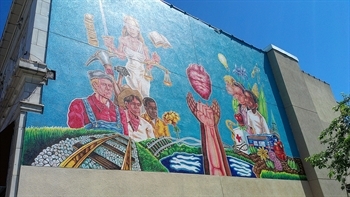
Abby Crisostomo
MPC has worked with Blue Island for many years on developing its natural and man-made assets.
 By Jason Berry, Planning and Building Commissioner, City of Blue Island
By Jason Berry, Planning and Building Commissioner, City of Blue Island - September 4, 2013
Blue Island, Ill. is a historic suburb on Chicago's south border: a town of its own in 1835, when it was first settled, and now part of a region that stretches from the southeast side of Chicago to Northwest Indiana. Founded as a center for pioneer commerce, medicine and banking, later our transportation and energy networks served the powerful Calumet region. This legacy of connections, stretching back generations, gives Blue Islanders a unique perspective—one clearly shared by Metropolitan Planning Council (MPC). We're ready to embrace the future (we always have) and are proud to have MPC on our team.
At Governing Magazine's inaugural FutureStructure Summit, we were reminded that policy and planning can come from above or come from below, but it's where they meet that we create a lasting, durable impact. MPC's work in Blue Island hits that sweet spot: guiding systematic change through housing policy, economic development and transportation, not afraid to volunteer on a weekend building rain gardens and installing rain barrels side by side with Blue Island residents. When you work with MPC, you work with MPC: quick to defer any hard-won praise to the community. It becomes Blue Island's success, something shared. The work MPC and Blue Island have done together focuses both on the built environment and the natural. Here, MPC staff weigh in on our efforts:

This mural on Western Avenue celebrates Blue Island's history.
Western Avenue reconfiguration
MPC Associate Yonina Gray
Western Avenue was once a bustling major arterial through Blue Island’s uptown community. In the 1970s the street was reconfigured to carry two and three lanes of one-way traffic, which alleviated some traffic congestion and created on-street parking opportunities for patrons. Unfortunately, this reconfiguration also has led to increased driving speeds and limited connectivity for drivers, which has made the Uptown area less pedestrian friendly and subsequently stifled the growth of the district. Metropolitan Planning Council, along with Dept. of Commerce and Economic Opportunity, Chicago Metropolitan Agency for Planning, Illinois Environmental Protection Agency and City of Blue Island are proposing that Western be reconfigured to carry two-way traffic. This would have tremendous impact on the rest of the community by supporting all of its efforts to increase its housing stock, attract businesses and visitors.
Riverfront master planning
MPC Program Director Josh Ellis
Blue Island is rare for the region, in that it has not one but two riverfronts: the north and south banks of the Cal-Sag Channel. That, along with its seven Metra stations, could be a real draw. Sadly, the resource is currently underutilized. This is much the same story for many communities—including Chicago—with access to the Cal-Sag. However, following a lease agreement by Blue Island and Metropolitan Water Reclamation District, which owns the riverfront land, MPC will lead the placemaking and communications efforts on a riverfront master planning process for Blue Island, working with Weaver Boos and Smith Group JJR, starting in late September, 2013. Through that process we hope to identify both great places on the riverfront, but also the people and organizations to make those places great.
Transit-oriented development
MPC Project Manager Breann Gala
The South Suburban Transit-Oriented Development Fund is working across the Chicago Southland to promote transit-oriented development (TOD) that incorporates a mix of retail, commercial and residential uses near transit stations. The Chicago Southland has enormous economic development potential, particularly due to its strong (but largely untapped) connectivity to the Chicago Loop, suburban job centers, and national transportation systems. MPC, along with Enterprise Community Partners, Center for Neighborhood Development, Chicago Community Loan Fund and the South Suburban Mayors and Managers, has established a $6 million loan fund to provide resources to investors interested in developing in transit-served areas. Currently the fund is processing a predevelopment loan to preserve and rehab an existing rental building in Blue Island!
Green infrastructure and stormwater management
MPC Associate Abby Crisostomo

MPC's Kara Riggio and Abby Crisostomo help with planting rain gardens.
Like most older urban communities, Blue Island has a combined sewer system, which means that both wastewater and stormwater go into the same pipes to be transported and treated. These pipes, built nearly a century ago, were not sized with modern-day impervious surfaces—like roads, parking lots and large buildings—in mind, and so they are often overwhelmed during storms, backing up a mixture of stormwater and sewage onto streets and into basements. MPC has been working with this neighborhood for over a year on concentrated green infrastructure for stormwater management in collaboration with a number of partners through the Blue Island, Blue Water initiative. So far, 125 rain barrels have been distributed at almost 40 locations; four native plant demonstration gardens were planted with 1,002 plants and 97 trees from Ill. Dept. of Natural Resources; and roughly 150 volunteers gave 1,200 volunteer hours to the green infrastructure cause in this vibrant Blue Island neighborhood. The City’s ability to leverage partnerships to accomplish stormwater management goals is a great model for other communities and will help make their community an even more attractive one.
Employer-assisted housing
MPC Associate Yonina Gray
The City of Blue Island’s largest employer, Metro South Medical Center, has seen growth in recent years and could potentially expand its workforce. MPC hopes to engage them with the employer-assisted housing (EAH) program, which encourages employers to offer down payment assistance to employees who opt to buy new homes close to work. The program provides a benefit that could attract and retain employees that would occupy Blue Island’s housing stock and bring much needed pedestrian traffic to the city’s Uptown district. EAH has a history of success with University of Chicago, Loyola University and City Colleges of Chicago.
Millennium Reserve
MPC Program Director Josh Ellis
The Millennium Reserve Steering Committee, which MPC President MarySue Barrett sits on, may soon select the Blue Island Intercollegiate Rowing Center as a priority project; state and other resources will be marshaled to help Blue Island capitalize on recent successes and nascent potential to become a major venue for intercollegiate rowing. MPC is providing staffing support to Millennium Reserve and guidance to Blue Island to make this happen. The Cal-Sag is uniquely suited to high-level rowing competitions because of its lack of current, protection from wind and straightness. Several area rowing clubs, high schools and colleges have expressed interested in using the rowing center as a permanent home. All the ingredients are there, and hopefully the resources that will be brought to bear through the Millennium Reserve will be enough to—pardon the pun—get this across the finish line.
MPC is helping Blue Island not only to address our residents’ needs today, but also to have a critical impact on Blue Island's future: improving the quality of life in our neighborhoods and supporting our most important resource, the Cal-Sag Channel, for sustainable future development. From placemaking to transit-oriented development, housing stock to stormwater infrastructure, together MPC and Blue Island can help ensure the work we do today reflects the needs and dreams of the Blue Island community tomorrow.
Jason Berry, AICP, is Planning & Building Commissioner for the City of Blue Island and principal of Bare Knuckle Planning. Jason's work is focused on active transportation policy and advocacy, green infrastructure, historic preservation, brownfields and community health. Jason is a board member of the Blue Island Historical Society, the Illinois Association for Historic Preservation Commissions, and a founding member of the Calumet Waterway Stewards, an organization dedicated to promoting recreation opportunities on the Little Calumet River and Cal-Sag Channel.